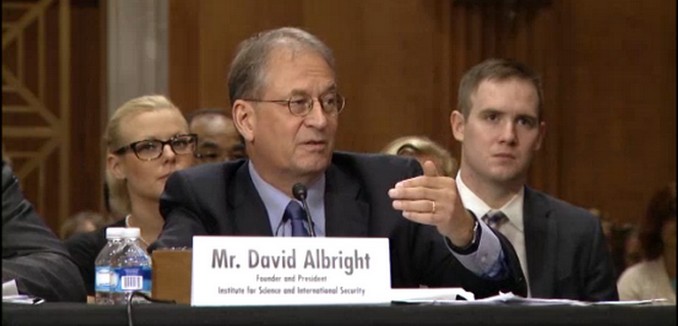Even if Iran follows the procedures laid out in the recent nuclear deal, it can still “break out” to nuclear weapons capability in as little as six to seven months, not a year as the Obama administration claims, David Albright, president of the Institute for Science and International Security, testified (.pdf) at a Senate hearing Tuesday.
Albright based this calculation on the deal’s failure to require full dismantlement of equipment at the Natanz facility, as well as the likelihood that Iran would deploy its more advanced IR-2m centrifuges in an attempt to break out. During the hearing, Senator Robert Menendez (D-N.J.) stated that Albright’s claim concerns him because, “six or seven months, that’s not going to be helpful if they decide to break out… The next president of the United States… will really only have one choice: to accept Iran as a nuclear weapons state or to have a military strike, because sanctions will be ineffective.”
Albright also criticized the deal’s provision giving Iran up to 24 days to provide access to suspicious undeclared sites. In his testimony, he wrote that Iran has extensive experience in evading International Atomic Energy Agency (IAEA) monitoring and that “twenty four days could be enough time, presumably, for Iran to relocate undeclared activities that are in violation of the Joint Comprehensive Plan of Action (JCPOA) while it undertakes sanitization activities that would not necessarily leave a trace in environmental sampling.” Additionally, Albright warned that the procurement channel set up by the deal falls short of what is needed to be effective, because there would only be up to 30 days to reject proposed exports to Iran, which is not enough time for countries such as the United States to assess whether certain exports to Iran could contribute to activities inconsistent with the deal.
Dr. Robert Joseph, former Under Secretary of State for Arms Control and International Security, also criticized the deal in prepared testimony (.pdf) because the deal recognizes and legitimizes a path to nuclear weapons, provides for ineffective verification, fails to prevent breakout, and fails to limit Iran’s ballistic missile development. Moreover, Joseph argued that the deal increases the likelihood of nuclear proliferation in the region, undermining the nonproliferation regime and the IAEA, and enabling a more aggressive and repressive Iranian regime, thereby increasing the prospect of conflict and war. He concluded that Congress should reject the deal because “a bad agreement is worse than no agreement.”




